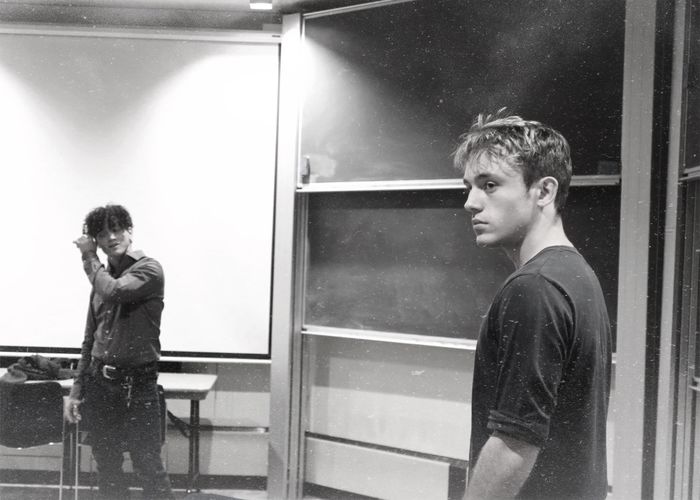A Voyage Round My Father goes nowhere
John Mortimer’s autobiographical play is a classic – but Supriya Finch struggles to understand why

Normally I find it frustrating when asked what ’the point’oof a piece of art is. “Well,”II always say in my smug literature student voice, “art doesn’t have to have a point, you know.” But today, I want to offer an apology to everyone I mansplained art to, because I really, truly did not see the point of A Voyage Round my Father.
The problem isn’t that nothing happens. Some of my favourite stories are ones in which nothing happens. That being said, in A Voyage Round my Father, it’s not just that nothing happens plot-wise, it’s that there wasn’t a single moment in the entire two hour run that I emotionally connected with. It’s like watching a play through a sheet of glass, with everything strangely smothered and remote. Lines designed to shock are stifled long before they ever reach the audience.
“There wasn’t a single moment in the entire two hour run that I emotionally connected with”
Of course, that isn’t entirely unintentional. The characters lead vapid and empty lives where no relationship ever goes beyond bemused acknowledgement at best, and long-suffering tolerance at worst. Unfortunately this idea lands with a resounding thump and goes no further. In fact, so do most of the themes that stick their heads above the parapet before being mown down by a barrage of self-indulgent British wit. In the first half I felt, optimistically, that there may be some comment made on the faulty transmission of information between generations, or perhaps some confrontation of the ubiquitous emotional constipation. Unfortunately these motifs, rather than be disrupted, deepened or interrogated, simply soldier grimly on for another hour. There’s certainly an argument to be made that the play is empty because it’s about emptiness, and about an empty man, but that begs the question: why bother to put this man on stage for two hours? If there truly never was any breakthrough or variation in John Mortimer’s father’s life, then perhaps an autobiography simply wasn’t a good choice.
“Why bother to put this man on stage for two hours?”
My own grandfather wasn’t totally dissimilar to the father character. He, too, was a blind man with a stiff-upper-lip who rarely discussed emotions. I had thought that I might gain a deeper understanding about blindness, intergenerational communication or silence from this play. Instead, I left wishing that Mortimer had considered discussing this with a therapist instead of the paying-kind of captive audience.
“Rupert Everett is blustering, pig-headed, callous, and enormously likeable”
The production itself is really not bad. Rupert Everett, as I’m sure he doesn’t need me to tell him, is wonderful. He is blustering, pig-headed, callous, and enormously likeable. His feat of ageing twenty years in one evening is remarkable, and wholly convincing. The rest of the cast does well enough given the unjoyful mundanity of the script. The set, which consists of stripped-back furnishings, does well at filling and defining the space, as does the blocking. Though the ever present projections of trees are inexcusably hideous, the rest of the lighting nimbly assists the play’s journey across time and through several locations.
Overall, I felt that if an alien landed on Earth and asked me to show it ‘theatre’ I would do well to show it this play: people stand and talk in a manner that has a faint whiff of self-congratulation, speaking quickly if they’re playing children and tremulously if they’re playing adults. Events occur in a limited sort of way, people stand in rows and do accents, and the actors do a prodigious job of pretending to be busy when they’re not directly involved in the dialogue. It’s quintessential capital ‘T’ theatre. It’s just not very interesting.
The cast (professional actors who no doubt have much more to their names than my two Camdram credits) may ask who I am to criticise with such authority. As always, I ask myself the same question. Nothing I’m saying is objective, and it’s worth noting that I spent much of the play laughing along with the rest of the audience. Some even gave it a standing ovation. The play has achieved significant success over the years, and has been adapted multiple times. That doesn’t change the fact that I found this play pointless. More than anything, for his sake, I just wished that Mortimer might finally pluck up the courage to say something meaningful to his late father. If Mortimer lets his father’s silence go entirely unconfronted, it comes as little surprise that the play ends up swallowed by this black hole of meaninglessness. At the end of the day, it seems unfair to expect the audience to take something away from a story in which all anyone does is do nothing.
A Voyage Round My Father is at the Cambridge Arts Theatre from Tue 17 - Sat 21 October.
 News / Uni to ‘review’ tripos rankings and weekend lectures in undergrad teaching overhaul10 April 2025
News / Uni to ‘review’ tripos rankings and weekend lectures in undergrad teaching overhaul10 April 2025 News / Rowing row continues as Oxford and Cambridge scrap women’s trial race9 April 2025
News / Rowing row continues as Oxford and Cambridge scrap women’s trial race9 April 2025 Comment / Death of the June Event?9 April 2025
Comment / Death of the June Event?9 April 2025 Features / Cambridge: where toxic productivity turns rest into a radical act8 April 2025
Features / Cambridge: where toxic productivity turns rest into a radical act8 April 2025 News / Under 3% of applicants for Cambridge academic jobs are successful7 April 2025
News / Under 3% of applicants for Cambridge academic jobs are successful7 April 2025






